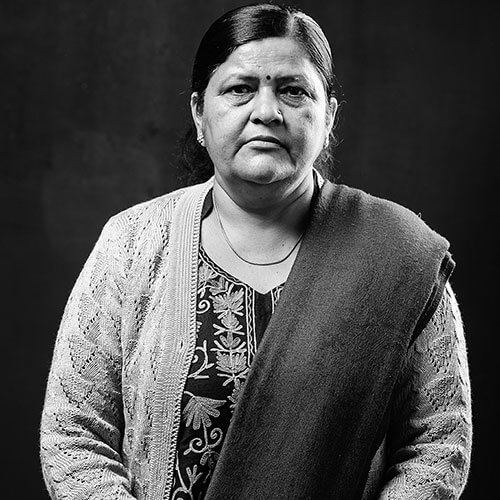Student activist disappeared in September 2003
FACTS

GyanendraTripathi, a member of the student wing of the Communist Party of Nepal – Maoist (CPN-M), was first arrested in August 2003, held incommunicado and severely beaten. Having gone into hiding to protect his family, he disappeared on 26 September 2003. He was last seen on 20 December 2003 in the notorious Maharajgunj army barracks.
Read more: here
Procedure
On 29 September 2003, Sharmila Tripathi, Gyanendra Tripathi’s wife, tried to report her husband’s arrest and later filed a complaint with the Supreme Court, without success. In October of that year, she also filed a complaint with the National Human Rights Commission of Nepal, which subsequently found that Gyanendra Tripathi had been arrested and disappeared. Despite those findings, no action was taken by the authorities.
On 28 September 2011, Sharmila Tripathi took the case to the Human Rights Committee, represented by TRIAL. In October 2014, the Committee reached its decision.
It found Nepal’s failure to conduct an investigation into the crimes in order to identify and prosecute those responsible violated international law, in particular the right to life, to liberty, to be free from torture and to be recognised before the law. It further found the State responsible for its failure to locate, exhume or identify the remains of Gyanendra Tripathi and that anguish and distress to Sharmila Tripathi amounted to prohibited ill-treatment.
Read the decisions here: English
RECOMMENDATIONS
The Human Rights Committee recommended that Nepal conduct a thorough and effective investigation into the disappearance of Gyanendra Tripathi, to establish his whereabouts, and to prosecute and sanction those responsible. It also recommended that Gyanendra Tripathi’s family receive adequate compensation and are provided with psychological and medical treatment as required, as well as other measures of satisfaction.
| Investigation of the facts and prosecution and sanctions of the perpetrators | |
| Nepal has failed to adopt measures with regards to the investigation, prosecution and sanction of those responsible. Nepal continues arguing that investigation into conflict-related crimes must be carried out by transitional justice bodies in spite of the well-established case law of the Committee that recall that transitional justice mechanism cannot replace judicial remedies in cases of gross human rights violations. | |
| Information on investigation | |
| No information has been provided to the wife of Mr Tripathi regarding the progress of the investigation. | |
| Providing adequate compensation | |
| Although the government considers support of the interim relief as compensation, such support cannot replace the compensation victims should receive. The family of Mr. Tripathi has not received any form of compensation for the harm suffered. | |
| Providing psychological rehabilitation/medical treatment | No information |
| Nothing has been done to provide the family of Mr. Tripathi with psychological rehabilitation and medical treatment | |
| Appropriate measures of satisfaction | |
| Nothing has been done regarding the satisfaction of the family of Mr. Tripathi. | |
| Amendment of legislation on torture and enforced disappearances | |
| Albeit the new Criminal Code (entered into force in 2018) codifies the autonomous offences of torture and enforced disappearance, the definitions of the crimes enshrined therein and the corresponding regulation – concerning, for instance, statutes of limitation and compensation – remains at odds with international law. | |
| Translation and dissemination | No information |
| The Views of the Human Rights Committee on this communication have been translated into Nepali but not disseminated widely. |
Note the gradings are made by the Human Rights Committee.
EFFORTS FOR IMPLEMENTATION
- Numerous letters sent to the Office of the Prime Minister, the National Human Rights Commission, the Ministry of Peace and Reconstruction, the Office of the Attorney General, the Ministry of Law and Justice, and the Ministry of Peace and Reconstruction, on February, April, September and October 2015
- Meeting of Ms. Tripathi with Minister of Peace and Reconstruction and Ministry of Law and Justice, April 2015
- Meeting of Ms. Tripathi and/or her legal representatives with representatives of the Office of Prime Minister, Ministry of Peace and Reconstruction and Ministry of Law and Justice, Office of the Attorney General and National Human Rights Commission, February, September, October and November 2015
- Follow-up report to the Human Rights Committee, October 2015
- Meeting of Ms. Tripathi’s legal representatives in Geneva (TRIAL) with the Human Rights Committee, November 2015
- Right to Information Application filed to the Office of Prime Minister, November 2015
- Follow-up report to the Human Rights Committee, December 2015
- Numerous letters sent to Human Rights Unit of the Office of the Prime Minister, Ministry of Law and Justice, National Human Rights Commission, Office of the Attorney General, Ministry of Peace and Reconstruction in June 2017
- Follow-up report submitted to the Human Rights Committee, August 2017
- Joint follow-up report submitted to the Human Rights Committee, October 2018
- Collective Follow-up report to the Human Rights Committee, June 2020
